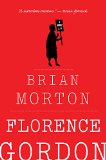Summary | Excerpt | Reviews | Beyond the book | Read-Alikes | Genres & Themes | Author Bio

The characters in The Seed Collectors tend to be foul-mouthed, sex-obsessed, neurotic, at times unethical, and often poorly behaved. In short, they are a mess. But a rather glorious mess. Written in a familiar, conversational, omniscient point of view, the contemporary novel's tone is witty, flippant, and entertaining. If you are a fan of Wes Anderson's films, you might think of this book as The Royal Tenenbaums on aphrodisiacs.
Throughout the story, the author deftly juggles over a dozen complex characters — a big complicated family of siblings, cousins and half-relations, all academics and intellectuals. Luckily there's a family tree included at the beginning; I had to refer to it often in order to keep things straight.
The characters are descendants of a horticulturist who was also the founder of Namaste House, a yoga retreat and Ayurvedic center in Sandwich, England. The novel opens shortly after the death of his daughter, Great Aunt Oleander. Oleander had spent her life running Namaste House, a popular escape for celebrities that offers Ayurvedic massages, macrobiotic dietary consultations, acupuncture and various other alternative therapies. (There are references to the Beatles' George Harrison, Gwyneth Paltrow and Madonna having stayed there.) The grounds are full of rare orchids along with other exotic plants. Oleander famously had a broad and all-inclusive view of spiritual philosophy and indeed, Namaste House is a mishmash of spirituality that borrows from Buddhism, Taoism, Christianity, Hinduism, and Wicca.
The main characters are Clem and her brother Charlie, their cousin Bryony, and Oleander's ward, Fleur. Clem teaches at the local university and makes award-winning documentaries about plants. Clem's brother, Charlie, is a single, self-absorbed womanizer who works at the Royal Botanic Kew Gardens and has a history of multiple affairs with women including his own relations. Cousin Bryony is a partner at a real estate agency and is working part-time on a graduate degree in Eighteenth-Century Studies. She's married to James, a journalist who writes a column called "Natural Dad" for a glossy. Bryony and James have two children: Holly, twelve, an anorexic tennis obsessive and her little brother, Ash.
And then there is Fleur, friend of — and possible relation to — Clem, Charlie and Bryony, who is left in charge of Namaste house after Oleander's death. The loose plot centers around the seed pods Great Aunt Oleander has left each of her grand-nieces and nephews. Believed to be deadly, they are also reported to be a key to enlightenment and what a few of the older family members were traveling the world in search of when they disappeared — and presumably died — years ago.
Sex is frequent, casual, raunchy and thought about obsessively. It is so extreme that it almost verges on the comedic, except for the unfortunate violent way that sex is portrayed, including multiple lurid fantasies of brutal rape. To me, the constant lewdness was an annoying distraction from the rest of the story. Yet underneath the disgust and titillation something interesting is happening: It seems the author may have modeled her characters' behavior after the plants that play such a big role in their family history, rendering the characters with baser plant-like instincts. At one point, as Clem works on one of her plant documentaries, she says: "You think that lettuce just sits there innocently on the ground hugging itself with its soft billowy leaves and dreaming of nothing more ambitious than being part of a salad or a mildly soporific soup? All lettuce wants is sex. And violence. Just like all plants. It wants to reproduce, and it wants to reproduce, and it wants to kill or damage its rivals so they won't reproduce."
Besides the sex, the book abounds with discussions of enlightenment, spiritual philosophy and ponderings on the nature of life and karma — much is tongue-in-cheek, making fun of "touchy-feely" interpersonal self-discovery groups, people who follow gurus, and those seeking a brand of convenient enlightenment, but there is an element of earnestness as well, including philosophical discussions on the topic of love and forgiveness.
The Seed Collectors is billed as a fantasy, but the real fantasy element, including a magical book that changes content according to its current owner's spiritual needs, doesn't even start to show up until more than half way in. And while this adds an amusing thread, it is not especially important to the novel as a whole, which is really about a cast of highly flawed characters, each on a collision course towards personal disaster. In the end each does encounter a crisis, but the author leaves the reader on an unexpectedly moving and uplifting tone that suggests that even flawed people might have a chance at enlightenment.
I recommend The Seed Collectors to mature readers who enjoy eccentric and complex family stories and are not put off by an abundance of X-rated sexual content.
![]() This review was originally published in The BookBrowse Review in June 2016, and has been updated for the
May 2017 edition.
Click here to go to this issue.
This review was originally published in The BookBrowse Review in June 2016, and has been updated for the
May 2017 edition.
Click here to go to this issue.

If you liked The Seed Collectors, try these:

by Chloe Benjamin
Published 2019
A dazzling family love story reminiscent of Everything I Never Told You from a novelist heralded by Lorrie Moore as a "great new talent."

by Brian Morton
Published 2015
A wise and entertaining novel about a woman who has lived life on her own terms for seventy-five defiant and determined years, only to find herself suddenly thrust to the center of her family's various catastrophes.
Your guide toexceptional books
BookBrowse seeks out and recommends the best in contemporary fiction and nonfiction—books that not only engage and entertain but also deepen our understanding of ourselves and the world around us.